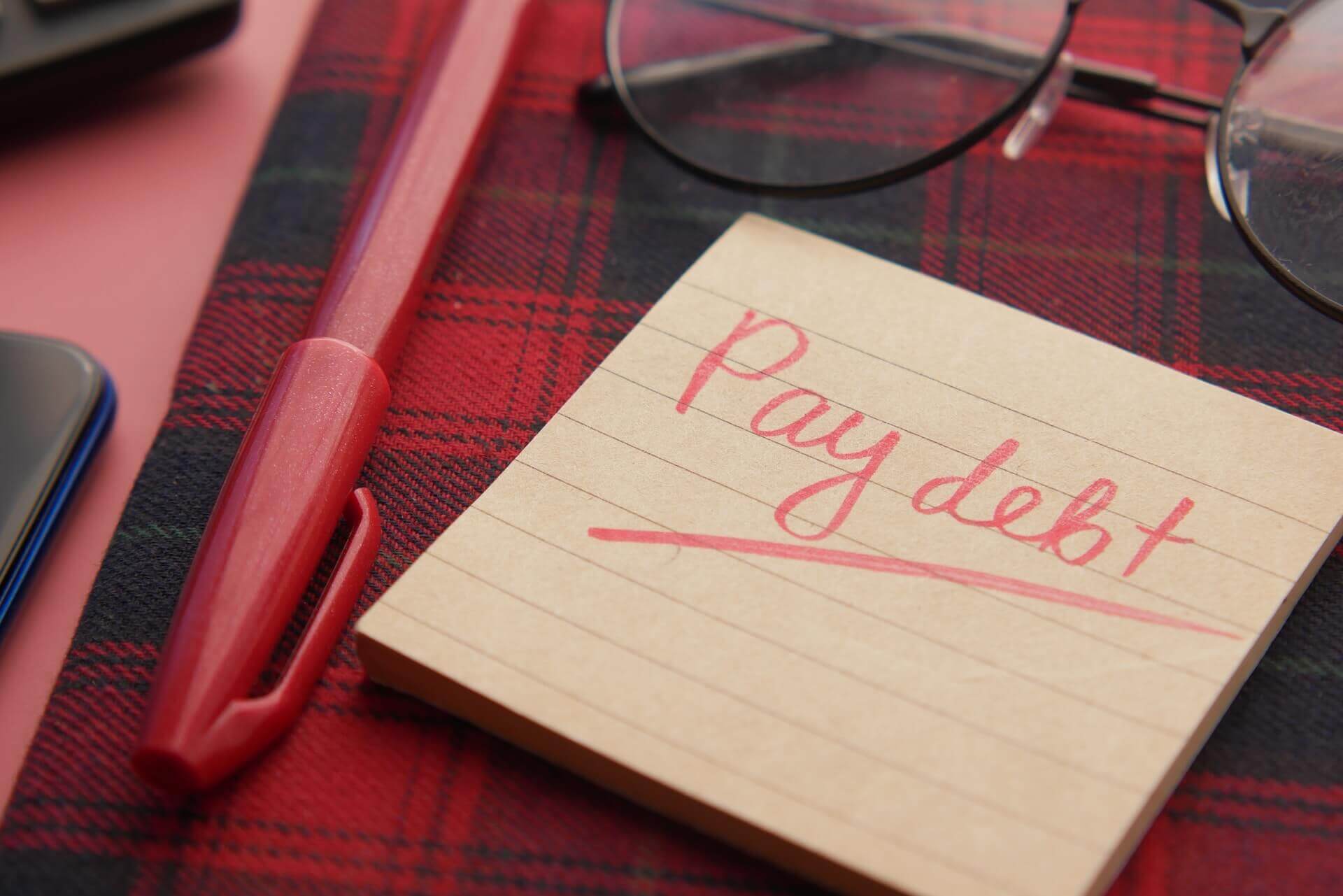Jun 24, 2024
5 min read
Business Line of Credit vs. Credit Card: Which Is Best?
Business financing comes in layers, like an upside-down pyramid. On the...
Read story

Business debt is an essential aspect of running a successful enterprise, but it’s important to understand how it can impact your credit score. Your credit score is a key factor in determining your eligibility for small business loans, line of credit, SBA 7(a) loans and other financial products.
As a business owner, knowing the relationship between business debt and your credit score will help you make informed decisions to ensure your business’s financial health and your own personal financial stability.
While both business credit scores and personal credit scores evaluate creditworthiness, they differ in several key ways.
But first, make sure you know how to properly check your FICO credit score!
A business credit score represents the creditworthiness of a company, and credit bureaus calculate it based on the business’s financial history. Factors affecting business credit scores include payment history, outstanding debt, length of credit history, and public records, such as bankruptcies or liens. A strong business credit score can help a company secure better interest rates, loan terms, and trade credit from suppliers.
A personal credit score, on the other hand, represents an individual’s creditworthiness. Credit bureaus calculate personal credit scores based on factors such as payment history, credit utilization (the ratio of credit used to available credit), length of credit history, types of credit, and recent credit inquiries.
A strong personal credit score can help individuals secure better interest rates on loans, credit cards, and even impact their ability to rent an apartment or secure a job.
While these two types of credit scores are distinct, it’s essential to recognize that, as a business owner, your personal credit score can impact your business’s ability to secure loans and credit, especially for small businesses and startups.
Certain types of business debt, such as personally guaranteed loans or business line of credit, can affect your personal credit score. Understanding the factors affecting each type of credit score can help you make better financial decisions for your business and personal finances.
There are several types of business debt that can have a direct effect on your personal credit score. These include:
Business debt can impact your personal credit score in several ways, and this impact can vary depending on the industry your business operates in. For instance, businesses in the dispensary, HVAC, or manufacturing sectors might have unique funding requirements and challenges. Regardless of the industry, it’s crucial to understand how business debt affects your credit score.
Your payment history accounts for the largest portion of your personal credit score. Late or missed payments on business debt, particularly for debts with personal guarantees or jointly owned debts, can lead to a lower personal credit score.
Credit utilization refers to the ratio of your outstanding credit balances to your total available credit. High balances on business credit cards, for example, can increase your credit utilization ratio, resulting in a lower personal credit score.
To maintain a healthy credit score, it’s important to keep your credit utilization below 30%, regardless of whether you’re using credit for dispensary funding, HVAC funding, construction business loans or manufacturing financing.
Opening new business credit accounts can impact the average age of your credit accounts, which is a factor in calculating your personal credit score.
A shorter credit history can lead to a lower credit score, so it’s important to be strategic about opening new credit accounts for your business, whether it’s for a cannabis-related business, veterinarian services, or construction financing operations.
To protect your FICO score from the potential negative effects of business debt, consider following strategies:
Establish separate bank accounts and credit cards for your personal and business finances. This will help you keep track of your expenses more effectively and minimize the chances of business debt impacting your personal credit score.
Ensure you make all your business debt payments on time. By doing so, you can avoid negative marks on your personal credit report, especially for debts with personal guarantees or jointly owned debts. Consider using debt repayment strategies like the Debt Snowball or Debt Avalanche methods to help you stay on track with your payments.
Regularly reviewing your credit reports and scores can help you identify any errors or discrepancies, as well as track your progress. By monitoring both your personal and business credit scores, you can take proactive steps to maintain a healthy credit profile.
By building a strong business credit profile, you can reduce your reliance on personal guarantees and minimize the impact of business debt on your personal credit score. To build business credit, ensure you have a registered business entity, obtain an Employer Identification Number (EIN), and establish trade credit with suppliers.
If you’ve experienced business debt issues that have negatively impacted your personal credit score, there are steps you can take to repair your credit.
Focus on paying down your outstanding debts, maintaining a low credit utilization ratio, and avoiding late payments. Additionally, diversify your credit mix by responsibly using different types of credit, such as installment loans and credit cards.
Review your credit report for errors or discrepancies, and promptly dispute any inaccuracies with the credit bureaus. Work with your creditors to negotiate payment plans or settlements for outstanding debts, which can help improve your credit score over time.
Develop a comprehensive plan to improve your credit score, including setting realistic financial goals, creating a budget, and regularly monitoring your credit progress. By committing to a long-term plan for credit score improvement, you can rebuild your personal credit profile and ensure future financial success for both you and your business.
Understanding the importance of maintaining a healthy debt-to-income (DTI) ratio can help business owners better manage their business debt and personal finances. A lower DTI ratio makes it easier for individuals to qualify for loans and receive better interest rates.
By paying off high-interest debts first and keeping your personal expenses in check, you can maintain a favorable DTI ratio, which is essential for securing loans and maintaining your financial health.
In some cases, business owners may need to consider bankruptcy as a last resort for managing overwhelming business debt. It’s crucial to understand the different types of bankruptcy, their implications for your business and personal FICO score, and the long-term effects on your financial health.
There are several types of bankruptcy that businesses can file, each with its own set of requirements and implications:
Filing for bankruptcy can have significant consequences for both personal and business credit scores:
Bankruptcy can have lasting effects on your financial health and should be considered only as a last resort:
Before considering bankruptcy, it’s important to explore all other options and consult with a bankruptcy attorney to ensure you’re making the best decision for your situation. Some alternatives to bankruptcy include:
Business debt consolidation can be a useful strategy for managing multiple debts and minimizing the impact on your personal credit score. By consolidating your debts into a single loan with a lower interest rate, you can simplify your monthly payments and potentially save on interest expenses. To effectively utilize business debt consolidation and manage your debt repayments, consider the following steps and strategies:
Make a list of all your outstanding business debts, including their interest rates, balances, and payment terms. This will help you determine if debt consolidation is a viable option for your financial situation.
Research various lenders and compare their interest rates, terms, and fees. Look for a consolidation loan with a lower interest rate than the average of your current debts, as this can help you save on interest expenses.
Carefully review the terms and conditions of any potential debt consolidation loan, paying particular attention to the repayment period, prepayment penalties, and any additional fees. Longer repayment periods may result in lower monthly payments but can increase the total amount of interest paid over time.
Choose the strategy that works best for your financial situation and motivation style by comparing debt snowball vs debt avalanche methods.
While debt consolidation can simplify your monthly payments and potentially save you money, it’s important to understand how it may impact your personal credit score. Opening a new loan account can temporarily lower your FICO credit score, but making on-time payments and reducing your credit utilization can lead to long-term improvements.
Once you’ve consolidated your debts, it’s crucial to continue practicing responsible debt management. Create a budget to track your expenses, avoid taking on additional debt, and prioritize making on-time payments to protect and improve bad credit score and financial health.

Jun 24, 2024
5 min read
Business financing comes in layers, like an upside-down pyramid. On the...
Read story

Jun 24, 2024
5 min read
Understanding how a business loan works is like tending to your...
Read story

Jun 24, 2024
5 min read
Business acquisitions are strategic investments that allow business owners to consolidate...
Read story

A funding specialist will get back to you soon.
If you can’t hang on then give us a call at (844) 284-2725 or complete your working capital application here.